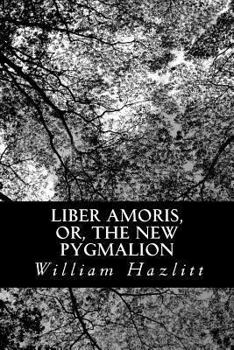Liber Amoris, or, The New Pygmalion
Select Format
Select Condition 
Book Overview
Spotlighting a unique essay in Romantic autobiography, this collection of Hazlitt's works center around the painfully candid memoir of unrequited love--"Liber Amoris." Coupled with a wealth of related... This description may be from another edition of this product.
Format:Paperback
Language:English
ISBN:1481030981
ISBN13:9781481030984
Release Date:November 2012
Publisher:Createspace Independent Publishing Platform
Length:70 Pages
Weight:0.25 lbs.
Dimensions:0.2" x 6.0" x 9.0"
Customer Reviews
1 rating
Painful Love Story
Published by Thriftbooks.com User , 21 years ago
William Hazlitt (1778-1830) was one of the best writers of essays in the English language, with a powerful, muscular, and modern prose style. He wrote about politics, the arts, literature, his friends (and former friends--he had a talent for alienating many of them) among the Romantics, including Coleridge and Wordsworth. He also wrote, thoughtfully and often charmingly, about himself and his own experiences. _Liber Amoris_, however, is an autobiographical account of a much more harrowing kind. It's the story of Hazlitt's love affair with the daughter of his landlady. Never very good with women (his first marriage was practically arranged by his best friend and fellow essayist, Charles Lamb), Hazlitt proved himself horribly maladroit in the handling of this romance. It was ill-conceived from the start. In 1820 Hazlitt was 43 and Sarah Walker was 19; Hazlitt, though estranged from his wife, was not yet divorced; and, as becomes clear over the course of the story, Sarah was actually much more worldly than Hazlitt himself. The failure of the affair brought Hazlitt to the brink of suicide; writing about it seems to have been his way of pulling himself back towards life by making sense of what had happened to him.Why read a love story that sounds so grim? Hazlitt's contemporaries wondered the same thing, and were shocked by its publication in 1823, partially because, as Ronald Blythe put it in the introduction to my edition of _Liber Amoris_, "To write it, Hazlitt had to abandon the only thing which could have made it even remotely socially acceptable--dignity." The Victorians also hated the story because of Hazlitt's acknowledgment of a physical relationship between him and Sarah--there's nothing graphic by any stretch of the imagination in the book beyond a few kisses, but this was enough to offend delicate 19th century sensibilities.But from a twenty-first century vantage point, most of these concerns have fallen away. We live in a confessional age where memoirists put their most tortured secrets on paper for public consumption; the idea of sexuality outside the bonds of marriage no longer has the power to make most of us faint dead away; and Hazlitt's method of composition seems as contemporary and up-to-the-minute as when it was written, a collage of dialogue, letters real and imaginary, and short, almost aphoristic musings on the nature of love and loss. Unobscured by shock and scandal, today _Liber Amoris_ bears incredible emotional force, because it shows without any attempt at prettification or prevarication a man in the throws of a doomed, obsessive, and largely unrequited love. The vast portion of the human race has felt what Hazlitt feels here: pathetic, dejected, undesired, aware of all that, and yet filled with an inexplicable longing, the sense that only one other person's nature fully appreciates his own. The reason to read and to admire _Liber Amoris_ is its unparalleled courage in committing to paper something that, whe





